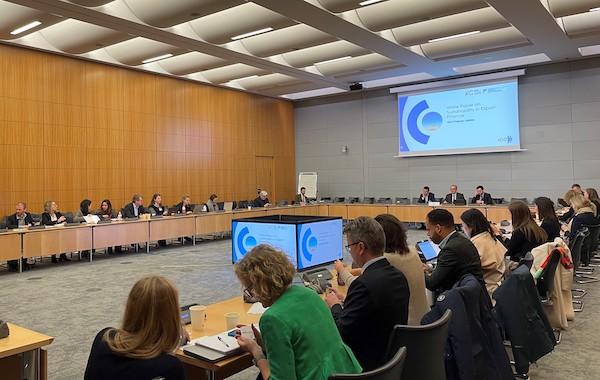Progress within export finance on sustainability, but changes sorely needed on OECD Arrangement
The ICC White Paper update report shows that ECAs and banks have made good progress on the sustainability front, but lack of change to the OECD Arrangement is holding the sector back.

This week the ICC has released its newly updated report on the state of sustainability in the export finance industry update (Sustainability in export finance: Leveraging export finance to support the delivery of the SDGs, White Paper progress report). The update is a very timely 32-page document which highlights how the sector has progressed on the sustainability agenda since the original award-winning White Paper was released back in September 2021.
The original White Paper (produced by ICC, Acre Impact Capital, The Rockefeller Foundation, and International Financial Consulting) provided policy and product recommendations designed to align the industry with the United Nations SDGs. The White Paper not only offers a roadmap towards a more sustainable export finance industry, but also provides suggestions from industry participants as to how the sector can change to ensure there are better terms for financing particularly for social projects and transactions.
The update was launched at an ICC workshop on 8 February in Paris, led by Ralph Lerch of DZ Bank and Hussein Sefian, founder and CEO of Acre Impact Capital, and Tomasch Kubiak of ICC, where discussions took place around the policy aspect, the framework alignment, the positive steps already witnessed and the route ahead for the sector including the roadblocks that are getting in the way of further improvements.
The ICC White Paper update steering c ommittee is made up of – Chris Mitman (Investec) & Ralph Lerch (DZ Bank) as co-chairs, James Pumphrey (Deutsche Bank), Yasser Henda (BNP Paribas), Kelly Wess (Citi), Tomasch Kubiak (ICC), Adam Connacker (formerly of The Rockefeller Foundation) – supported by the ICC Export Finance Sustainability Working Group of 16 banks –namely: ANZ, BNPP, CACIB, Citi, Commerzbank, Deutsche Bank, DZ Bank, ING, Investec, JP Morgan, Lloyds Bank, MUFG, RMB, Santander, SMBC, Standard Chartered, and UniCredit along with Acre Impact Capital, and ICC.
ommittee is made up of – Chris Mitman (Investec) & Ralph Lerch (DZ Bank) as co-chairs, James Pumphrey (Deutsche Bank), Yasser Henda (BNP Paribas), Kelly Wess (Citi), Tomasch Kubiak (ICC), Adam Connacker (formerly of The Rockefeller Foundation) – supported by the ICC Export Finance Sustainability Working Group of 16 banks –namely: ANZ, BNPP, CACIB, Citi, Commerzbank, Deutsche Bank, DZ Bank, ING, Investec, JP Morgan, Lloyds Bank, MUFG, RMB, Santander, SMBC, Standard Chartered, and UniCredit along with Acre Impact Capital, and ICC.
Speaking to TXF about the Whiter Paper update, Chris Mitman, co-chair of the ICC Sustainability Working Group (ICC SWG) said: “It’s clear from this White Paper update that the vast majority of export finance participants – banks and ECAs – have individually made step changes in their response to the SDG delivery challenge.
“It’s also clear at an industry level there are encouraging signals from the EU and the majority of the Berne Union membership that a fundamental reform of the regulatory framework – most notably the OECD consensus – is required.”
He added: “It’s critical therefore, that those few who are fortunate enough and have the privilege of holding seats at these unprecedented OECD modernisation discussions, take this once in a lifetime opportunity to put the export finance industry in a fundamentally stronger position to contribute meaningfully to the delivery of the SDGs. The legacy of today’s leadership will be there for all to see for years to come”.
Also commenting to TXF on the updated report, Ralph Lerch, co-chair of the ICC SWG remarked: “The update illustrates a very healthy evolution of the whole export finance industry towards more reliable ESG strategies, targets and product innovations. But we’ve also noticed a high expectation and strong vote in the market for a revision of the OECD arrangement to provide more flexibility and incentives for transactions that support global sustainability goals.”
And Hussein Sefian, founding partner & CEO, Acre Impact Capital, also told TXF: “One year after the publication of the seminal, award-winning white paper, this short status update is intended to provide a ‘report card’ that assesses the extent to which the industry has - or has not - adopted the recommendations outlined in the white paper. There have been some encouraging areas of progress, but more needs to be done.”
The White Paper update uses an efficient system of grading the original recommendations from 1-5 and using a slider to demonstrate what progress has been made. As already noted, good progress has been made in many areas, but only one of the original recommendations – that of phasing out support for coal – has scored a 5 out of 5. And at the other end of the scale, the only original recommendation scoring a 1 out of 5 is ‘Seize and accelerate the modernisation of the OECD Arrangement to reflect and deliver on global sustainability commitments.’ As such, it is little surprise that the update is critical of the slowness of modernisation of the Arrangement.
On a very positive note, TXF learns that could be some progress on the modernisation of the OECD Arrangement. Although long overdue, there are rumours that the OECD could make an announcement about the implementation of a modernisation package for the Arrangement sometime in the early part of 2Q 2023. And, importantly, it could include longer tenors for social infrastructure projects - up to 15 years. The OECD realises that much longer tenors would be welcomed by the export finance industry, but it also understands that it does make them more challenging to be competitively funded.
In conclusion, the White Paper update noted how real progress had been made on the climate issues: “ECAs have made an explicit commitment to stopping all support to coal, a commitment now enshrined in the OECD Arrangement. In addition, a number of countries have agreed to phase out support for the international unabated fossil fuel energy sector.
“The idea that ECAs have a role to play in supporting the transition to a lower carbon future is now largely accepted, as per the conclusions of the Council of the European Union. International coalitions such as the E3F and the Berne Union Climate Working Group are working to support the transition of the export finance industry towards a climate-aligned future. There is increasing support for new and innovative companies and export technologies that help address the world’s most pressing problems, and many ECAs are providing incentives to encourage green exports.”
At the same time, it criticised the lack of progress on change of the Arrangement: “The White Paper made the point that the biggest opportunity to shift industry volumes towards more sustainable transactions lies in the modernisation of the OECD Arrangement. It is thus disappointing that, at a time of writing, there has been no formal progress. ICC urges policy makers to urgently finalise a modernisation package that includes sustainability at its core.”
And importantly, attention was also drawn to the need for increased assistance on social deals: “Finally, it is clear from this progress report that the social dimension is missing from the deliberations of ECAs and their guardian authorities, as the focus has remained on climate-related policy. However, this is an area of increased interest from ECA banks and their clients. Banks (alongside ECAs) continue to support the development of essential social infrastructure in developing economies, as demonstrated by the trend of labelling export finance loans as social loans, in line with the LMA Principles.
“It is well accepted that under-served or vulnerable populations are less able to adapt to changing climate patterns. Thus, supporting such populations through climate-resilient essential social infrastructure should also be a part of the policy debate. Climate-resilient social infrastructure projects that provide essential services to under-served or vulnerable populations should also benefit from more flexible terms and conditions.”
Note:
The White Paper update report can be found at the following ICC link:
https://iccwbo.org/publication/sustainability-in-export-finance/
You need to scroll to the bottom of the document, to the button, ‘Download the 2022 White Paper Progress Report’ to access the 32-page document.
Also see:
https://www.txfnews.com/articles/7361/New-BU-Climate-Working-Group-rolls-up-its-sleeves
https://www.txfnews.com/articles/7329/Sustainability-in-export-finance-the-push-for-change





